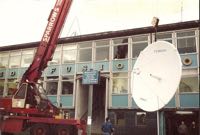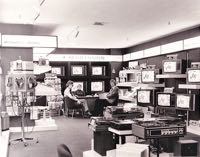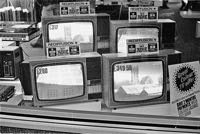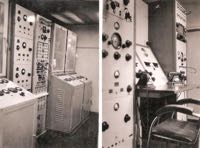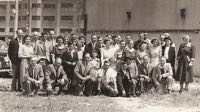
Exeter Stories
Exeter folk and friends in their own words - 1890's to the 1990's │ << Previous story │ Next story >> │
History of Exeter Rediffusion by Ken Ward
In Exeter the Rediffusion Company started life in the early 1930's as Exeter Radio Exchange being a company that relays two BBC radio programs the ”Home” and “Light” over a cable network direct to people's homes. This system was licensed by the Exeter City Council.
This distribution cable went from house to house along the eaves or between chimney stacks. To use the system all that was required by the subscriber in the home was a simple selection switch, loudspeaker and volume control, no mains electricity was required.
I believe the Radio Exchange Company was formed by Mr F D Newcombe who had a electrical components sales business from premises situated towards the top of North Street.
In the early days of radio reception a relay system was a much simpler method of receiving radio programs then a radio set . No out door aerial was required nor the purchase of occasional HT (high tension) battery or the LT (low tension) accumulator which also had to be taken to a radio dealer or a garage for it's weekly over night charge. The relay company expanded it's network through the city from a radio receiving and sound amplifying station situated in premises in Albert St Newtown near it's junction with Belmont Rd.
Payments were made to property owners for the attachment of cable, by means of a Peppercorn Rental of one shilling (5p) a year.
In the Exeter blitz of 1942 these premises were lost in the bombing together with all of there relay equipment.
Not only was their receiving and amplifying equipment but the overhead cable network was damaged by the loss of properties by bombing. At that time the main trunk cable feeding the St Thomas area of the City used the old tram poles that remained from the old tram route along High St, this trunk route was a big loss to the company by the bomb damage.
This sudden damage to the whole of the system at such a difficult time during the war with shortage of skilled labour, it would be such a mammoth task by any company to make good.
The Exeter Relay Exchange was quickly bought out by Broadcast Relay Service Ltd the parent company of Rediffusion.
This company had a very extensive relay networks on Tyneside,a number of skilled wiring gangs were quickly transferred to the City to get the cable up and working. At the same time a disused garage on the bomb site in Albert St was used to house temporary receivers and amplifiers to get the system on the air.
While this temporary work was being carried out a permanent building was being erected on the same site, and constructed to the same standard as a surface air raid shelter. This building would house the latest receiving and amplifying equipment, and was brought into use in about 1942, and commenced trading as Rediffusion.
To improve the quality of the radio programs a P.O. direct lines were was installed between the BBC studio and Rediffusion Control.
A new showroom and offices was opened in Sidwell St next to Hammett's Dairies just on the opposite side of the road to Force & Sons Estate Agents,at the rear of the property was a wiring store.
Over the next few years subscriber numbers using the network greatly increased. and the company moved to larger premises at the top of Fore St.
As TV developed through the country the cable network was adapted to carry two TV channels in addition to the existing two radio programs. Television aerials were attached to the old Radar mast's from the war years at the top of Pennsylvania, receiving equipment was set up on this site.
It was ideally situated to receive distant television channels that were otherwise out of range in with a normal aerial in the City.
This receiving advantage continued for some years. Some satellite reception of TV was introduced in later years.
The company moved their show room to a more central position in Sidwell St and had a substantial workshop and offices was specially built for them in Stover Court, Bampfield Street.
The distribution system proved to be very successful over many years. In more recent years the numbers of TV channels that it was possible to receive with a normal aerial increased greatly in number, this had a adverse effect on the popularity of the company's cable system.
The company Rentokill bought out BET, becoming the parent company of Rediffusion.
With the reduction of the number of subscribers using the cable network, the company concentrated on the sales and rental of television receivers.
With the ageing cable network in decline it was decided that the company be split into two parts and offered for sale.
The larger of the two sections, TV sales and rental was bought out by Granada TV. Who then moved to a showroom in the Guildhall Precinct where they successfully traded for many years.
The cable network was taken over by Robert Maxwell, but did not remain in business very long after that.
Republished with permission. See Rediffusion in Exeter
│ Top of Page │
